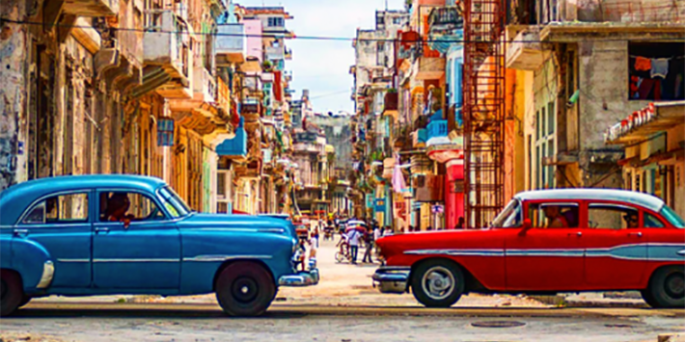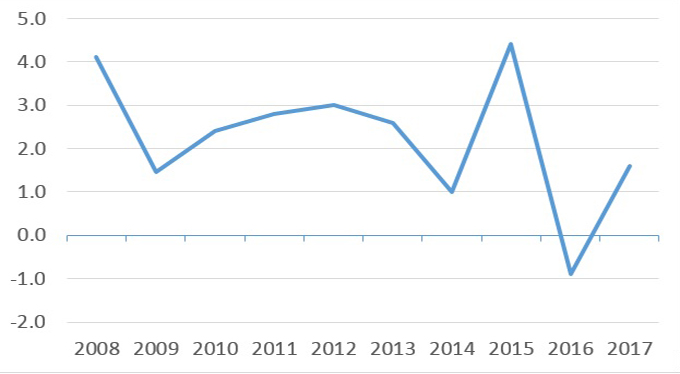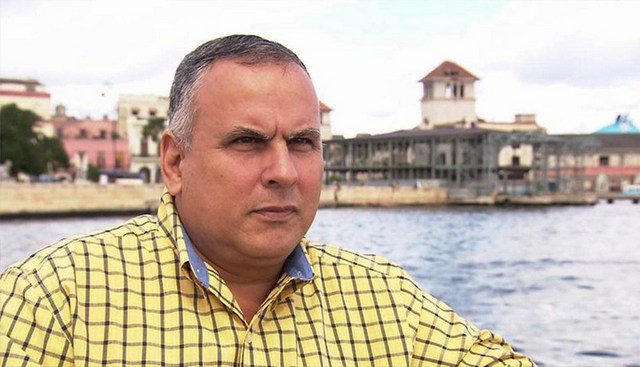
Challenges and results for Cuba since 2017
HAVANA — Undeniably, the international context did not favor Cuba in 2017, but that context has been the same for many years, including the years of the U.S. blockade. What I mean to say is that Cuba — as a small and underdeveloped economy with a domestic structural crisis it has not overcome — will always be influenced by an adverse international context.
For that reason, the country will have to assume challenges to overcome its economic crisis that it hasn’t assumed so far, which I shall mention later. Although it is true that the economic outcome for 2017 is positive (the GNP grew by 1.6 percent), it surprised many economists, including the CEPAL [Economic Commission for Latin America] which had estimated a much reduced growth based on the historic structure of the nation’s economic growth, which gained great momentum in the first half of the year.

Among the principal factors that acted negatively this year is the by-now-habitual failure to fulfill the plan of exporting goods; add to this the reduction in the collection of payment for exported services. As in 2016, the lack of oil has been a stressful factor, because of the drop in production from national wells and the late arrival of oil from Venezuela for two consecutive years.
Other recurrent factors are those associated with climate problems, such as Hurricane Irma.
Among the activities that contributed to growth in 2017 is, first of all, tourism, with a two-digit increase in the number of visitors. Tourism could bring in 4.7 million visitors in 2017, as the sector grows by 4.4 percent. What we should analyze is the efficiency of the tourism industry because Cuba is not the Caribbean country that receives the most revenues from existing hotel accommodations.
Then come the communications and transportation sectors, with an increase of 3 percent, and agriculture (3 percent), although most of the population does not benefit from the increase in farm production because the retail prices are very high.
It is incomprehensible to me that, with all the idle land we possess, together with the idle land leased in usufruct for production, Cuba imported $1.67 billion worth of food in 2017.
In hard-currency retail stores (and the economy in general) we have seen shortages of some imported consumer goods. This is caused by overdue payment to suppliers, despite the extended payment terms granted to us — in some cases, more than two years.
In general, the suspension of imported goods to Cuba has become a smothering factor in many areas of the economy. In addition, during the first half of the year, imports for the second half dropped by more than $1.5 billion.
In the recent history of Cuba’s economy, the investment plans made have never been fulfilled. In 2017, we will achieve 90 percent of the approved plan, which delays the production of specific items and immobilizes financial resources for a period longer than the one approved, among other effects.
There is a contradiction in the fact that, although non-state enterprises’ contributions to the budget have increased and show growing potential, a freeze has been imposed on the licenses for private businesses with the greatest profitability. The freeze has lasted six months, and no date has been set for the new regulations that will govern private enterprises.

The authorities claim that the budget revenue has increased by 2.3 percent, an achievement created by the gains in state-run enterprises, territorial contributions, and the non-state sector.
It is also significant that retail trade has overfulfilled its cash plans by 14 percent, an accomplishment due basically to the participation of non-state [private] businesses.
While it is fair to say that the country has managed to fulfill its agreements for the renegotiation of government indebtedness and is making an effort to pay its suppliers, some delays have already been noted.
For three years now, the government has insisted on the need to pay greater attention to foreign investment, one of its priorities. However, given Cuba’s potential to attract more foreign capital, the economy does not advance at the pace it needs to. The pace accelerated in 2017, when we had $2 billion in commitments, but that wasn’t a real investment for the year.
For 2018, we’re expecting foreign-capital investments to reach some $600 million only. Remember that the country must increase its gross formation of capital to at least 25 percent in relation to the GNP, and to do this, in addition to the national investment, Cuba must attract foreign investments totaling more than $2 billion a year.
The causes repeat themselves year after year: an excessive bureaucracy, projects with deficient feasibility studies, problems with the infrastructure, etc.
The latest National Assembly session reprised the topic of monetary and exchange duality and insisted that a solution is mandatory because it is one of the first priorities of the Committee To Implement the Economic Guidelines, but the topic has been raised constantly for several years.
A new timetable will have to be discussed during the plenum of the Central Committee of the Communist Party of Cuba in the first quarter of 2018. Currency reform is one of the most complex measures to be carried out, and the consequences of its implementation have been explained to the people — but it can no longer be postponed.
The government must understand that an expansion of the activities authorized for self-entrepreneurship can be postponed no longer. However, judging from official announcements, it doesn’t plan to increase that number but to reduce it by compacting some. The government should also accelerate the creation of small and mid-size enterprises in industry, commerce and services.
It is necessary to solve the question of wholesale markets, allowing them to sell directly to private entities or cooperatives, among other clients. By clearly knowing the various transactions they make, there would be fair competition among all forms of property and greater control of the taxable entities.
It is revealing to observe the evolution of China’s economy at present and the role of its Communist Party leaders in the defense of the socialist system during the latest Party Congress. While many elements could be analyzed by the Cuban authorities, I shall mention only one: the role of the private sector in the Chinese economy, as reported by the Cuban press.
It is understandable that our government is trying to buttress its enterprises as the fundamental form of property in its socialist project. But we must be wary of monopolies, which conspire against innovation and in some cases lower the quality of their consumer goods. Competition is necessary and useful to create new products, lower prices and retain clients, among other aspects.
In general, Cuba should hold on to its achievements in the social sphere and continue to invest in the maintenance of social indicators that place the country at the head of more robust economies.
However, the sustainability of those aspirations can only be achieved if the practices utilized so far are changed, if the entire potential of human resources is put to use, and if all the existing forms of property are brought together to achieve the economic development expected by an important part of the Cuban society.
The economic plan leading to 2030 clearly defines the strategic lines to be followed, but it must have indicators that are strictly observed and analyzed, if we’re really advancing toward development.
Throughout the many years since the First Congress of the Cuban Communist Party, many documents have been written and many plans have been drafted, yet the country still suffers from very strong structural distortions that everyone is aware of and have been critically analyzed ever since that First Congress.
Omar Everleny holds a doctorate in Economic Sciences from the University of Havana (1998) and a Master’s degree in Economics and International Policy from the Center for Research and Economic Studies in Mexico (1990). He was director of the Center for Studies of the Cuban Economy at the University of Havana, from which he was expelled in 2016.

